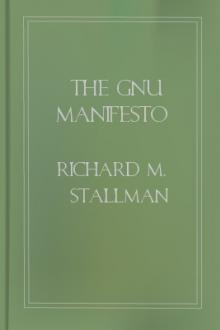The GNU Manifesto by Richard M. Stallman (best book recommendations .txt) 📖

- Author: Richard M. Stallman
- Performer: -
Book online «The GNU Manifesto by Richard M. Stallman (best book recommendations .txt) 📖». Author Richard M. Stallman
We have already greatly reduced the amount of work that the whole society must do for its actual productivity, but only a little of this has translated itself into leisure for workers because much nonproductive activity is required to accompany productive activity. The main causes of this are bureaucracy and isometric struggles against competition. Free software will greatly reduce these drains in the area of software production. We must do this, in order for technical gains in productivity to translate into less work for us.
Footnotes
(1) The wording here was careless. The intention was that nobody would have to pay for permission to use the GNU system. But the words don’t make this clear, and people often interpret them as saying that copies of GNU should always be distributed at little or no charge. That was never the intent; later on, the manifesto mentions the possibility of companies providing the service of distribution for a profit. Subsequently I have learned to distinguish carefully between “free” in the sense of freedom and “free” in the sense of price. Free software is software that users have the freedom to distribute and change. Some users may obtain copies at no charge, while others pay to obtain copies—and if the funds help support improving the software, so much the better. The important thing is that everyone who has a copy has the freedom to cooperate with others in using it.
(2) This is another place I failed to distinguish carefully between the two different meanings of “free”. The statement as it stands is not false—you can get copies of GNU software at no charge, from your friends or over the net. But it does suggest the wrong idea.
(3) Several such companies now exist.
(4) The Free Software Foundation for 10 years raised most of its funds from a distribution service, although it is a charity rather than a company. You can order things from the FSF.
(5) A group of computer companies pooled funds around 1991 to support maintenance of the GNU C Compiler.
(6) In the 80s I had not yet realized how confusing it was to speak of “the issue” of “intellectual property”. That term is obviously biased; more subtle is the fact that it lumps together various disparate laws which raise very different issues. Nowadays I urge people to reject the term “intellectual property” entirely, lest it lead others to suppose that those laws form one coherent issue. The way to be clear is to discuss patents, copyrights, and trademarks separately. See further explanation of how this term spreads confusion and bias.
(7) Subsequently we have learned to distinguish between “free software” and “freeware”. The term “freeware” means software you are free to redistribute, but usually you are not free to study and change the source code, so most of it is not free software. the Confusing Words and Phrases page for more explanation.
–-
Copyright (C) 1985, 1993, 2003, 2005 Free Software Foundation, Free Software Foundation, Inc., 51 Franklin St, Fifth Floor, Boston, MA�02110, USA
Permission is granted to anyone to make or distribute verbatim copies of this document, in any medium, provided that the copyright notice and permission notice are preserved, and that the distributor grants the recipient permission for further redistribution as permitted by this notice.
Modified versions may not be made.
Updated:
$Date: 2005/07/13 15:42:47 $ $Author: wkotwica $





Comments (0)